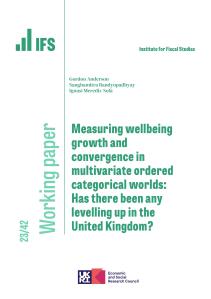The never-ending political saga that is Brexit continues, apparently in a world of its own. But events in Westminster are not occurring in some hermitically sealed other world. Much though many of us might like to ignore it until some kind of agreement finally emerges, effects on the real world are becoming increasingly clear. As this absurd political farce rumbles on, our parliamentarians need to understand that their fellow citizens are already suffering economic consequences.
Last week the government published its latest figures on inequality and poverty. A small rise in the poverty numbers got some publicity. Much more striking was the fact that these figures showed zero income growth for households in 2017-18. Zero. That is not normal. In the past 30 years, that or worse has happened only during the 1990 recession and in two years that followed the 2009 crisis.
Why was there no rise in real incomes? Because inflation rose after the post-referendum fall in the value of the pound and earnings did not follow suit. Higher inflation also meant that the government-imposed benefits freeze hit millions of the poorest working-age households harder. Public sector workers facing 1 per cent pay awards also suffered.
The tragedy of that stalling in income growth is that in the preceding three or four years things were beginning to get a bit better. Incomes were rising at a decent rate between 2013 and 2016, faster, in fact, than during the immediate pre crisis years in the mid-2000s. They might have continued to do so under other circumstances.
Business investment has suffered, too. It is far below where it should be at this stage in the economic cycle, far below where it was projected to be pre-referendum and lower than in our leading competitors. This will only accentuate our already poor productivity and wage performance. And it is not a surprise: we know that increasing uncertainty reduces investment.
The economy itself is probably about 2 per cent smaller than it would have been in the absence of the referendum. That’s the view of the Bank of England and most other economic forecasters. Under the circumstances, the public finances are in a better state than we might have feared. Borrowing is now below pre-crisis levels and is at its lowest level since the turn of the century. All being well, we should, finally, see an end to austerity in the upcoming spending review. There is room to keep borrowing at relatively low levels, to keep debt falling as a fraction of national income and to start to raise public spending again.
Two caveats. The first is that if we hadn’t lost that 2 per cent of economic growth — or £40 billion in round terms — then austerity probably would have ended already and more decisively. Second, looking to the future, that room for extra spending without further tax rises does depend on continued economic growth, even at the puny rate presently forecast by the Office for Budget Responsibility and the Bank of England. And those growth forecasts depend on Britain departing from the European Union in an orderly way.
More specifically, the forecasts are predicated on something like Theresa May’s deal being agreed. From an economic point of view, the deal has a number of downsides relative to the status quo. Leaving the single market will be costly. Continued membership of the customs union would be helpful to manufacturing, but would do nothing for the much larger services sector. Those who say that it will leave us financially worse off than a deal that kept us in the customs union and the single market indefinitely are almost certainly right. But if the forecasters are right, it should at least keep us growing at a modest rate.
What about a “no-deal” Brexit? It is just not possible to say what the scale of the immediate economic impact would be. In the words of the Office for Budget Responsibility: “It is next to impossible to calibrate with any confidence the potential impact of this sort of scenario in advance, because of the lack of any relevant precedent”. It goes on to note that, while not an exact parallel, the three-day week, introduced in early 1974 in response to energy shortages and miners’ striking, was “associated with a fall in output of a little under 3 per cent that quarter”.
We would be in uncharted territory. The CBI and TUC, in their joint letter to the prime minister, talk about a national emergency and an economic shock that would be felt for generations to come. Strong words, indeed. Maybe the result would be nothing like that bad. But it would be a risky path to tread.
The effects of further delay and uncertainty are just as hard to determine. While our future relationship with the European Union remains so unclear, we can hardly expect business, and particularly multinational businesses that are so important to our economic prosperity, to invest. It is easy to see delaying a decision as a good way of avoiding, or at least delaying, bad outcomes. It is, in fact, costly in itself. The longer the political wrangling continues, the more we will pay in lower investment and, eventually, lower wages.
In the end, our elected representatives will have to reach some sort of conclusion. That they agree on nothing was amply demonstrated by the failure to achieve a majority in any of last week’s indicative votes. In most walks of life, that would imply finding a means to reach a compromise. And compromise there will need to be.
We cannot have our cake and eat it. Decisions have consequences, and so does failure to decide. Pretending that there are no consequences won’t make them go away.
This article was originally published in The Times and is reproduced here with full permission. Paul Johnson is director of the Institute for Fiscal Studies. Follow him on @PJTheEconomist.








